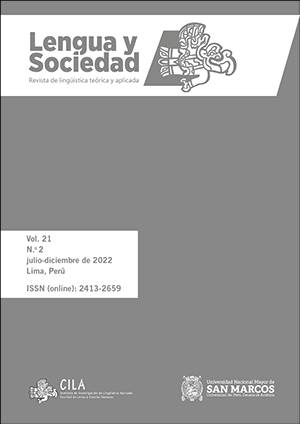Towards a review of the legal language in court sentences
DOI:
https://doi.org/10.15381/lengsoc.v21i2.23444Keywords:
plain language, democratization, law, sociolinguistics, social inclusionAbstract
Based on the assumption that law has as its foundation of validation the people themselves, and aligned with the plain language movement, this paper initially discusses the role of technical language in the scope of the community of legal practices and the effects of its extrapolation to civil society. It also discusses the social implications of the exacerbation of the use of area jargon in legal language, as well as analyzes mechanisms that monopolize and democratize this access to legal content. Finally, an experimental study is carried out to measure civil society's perception of legal language, identifying points that may contribute to its democratization. The investigation concludes that the simplification of the language, without de-characterizing the legal technique, contributes to the understanding of legal content, which signals the importance of training actions in the area of simple language aimed at the law.
References
Assy, R. (2011). Can the law speak directly to its subjects? The limitation of plain language. Journal of Law and Society, 38(3), 376-404. https://doi.org/10.1111/j.1467-6478.2011.00549.x
Barroso, L. (2010). Curso de direito constitucional contemporâneo. São Paulo, Saraiva.
Belém, M. (2013). A simplificação da linguagem jurídica como meio de aproximação do cidadão à justiça. Revista Jurídica da Seção Judiciária de Pernambuco, 6, 313-320. https://revista.jfpe.jus.br/index.php/RJSJPE/article/view/97
Bobbio, N. (2019). Teoria da norma jurídica. Bauru, Edipro.
Bortolai, L. (2016). Acesso à justiça e os obstáculos apresentados pela linguagem jurídica. Redes. com: revista de estudios para el desarrollo social de la Comunicación, 14, 168-193. https://dialnet.unirioja.es/servlet/articulo?codigo=5778581
Bourdieu, P. (2013). Capital simbólico e classes sociais. Novos estudos CEBRAP, 105-115. https://doi.org/10.1590/S0101-33002013000200008
Cotta, S. (2017). Para um Reexame das Noções de Jusnaturalismo e Direito Natural. Revista da Faculdade de Direito da UFRGS, 36, 26-54. https://doi.org/10.22456/0104-6594.76093
Dallari, D. (1998). Elementos de Teoria Geral de Estado. São Paulo, Saraiva.
Eckert, P. (2012). Three waves of variation study: The emergence of meaning in the study of sociolinguistic variation. Annual review of Anthropology, 41(1), 87-100. https://doi.org/10.1146/annurev-anthro-092611-145828
Freitag, R. (2014). Covariação em uma comunidade de práticas. In: Lopes, N., Ramos, J. & Oliveira, J. (Eds.) Diferentes olhares sobre o português brasileiro. Feira de Santana, Editora UEFS, pp. 13-30.
Freitag, R. (2018). Amostras sociolinguísticas: probabilísticas ou por conveniência? Revista de Estudos da Linguagem, 26(2), 667-686. http://dx.doi.org/10.17851/2237-2083.26.2.667-686
Freitag, R., Martins, M. & Tavares, M. (2012). Bancos de dados sociolinguísticos do português brasileiro e os estudos de terceira onda: potencialidades e limitações. Alfa: Revista de Linguística, 56(3), 917-944. https://doi.org/10.1590/S1981-57942012000300009
Gonçalves, C. (2021). Direito brasileiro: parte geral. São Paulo, Saraiva.
Grene, M., Cleary, Y. & Marcus-Quinn, A. (2017). Use of plain-language guidelines to promote health literacy. IEEE Transactions on Professional Communication, 60(4), 384-400. https://doi.org/10.1109/TPC.2017.2761578
Guimarães, L. (2012). A simplificação da linguagem jurídica como instrumento fundamental de acesso à justiça. Publicatio UEPG: Ciências Humanas, Linguística, Letras e Artes, 20(2), 173-184. https://doi.org/10.5212/publ.humanas.v20i2.4270
Kelsen, H. (1999). Teoria pura do direito. São Paulo, Martins Fontes.
Labov, W. (1972). Sociolinguistic patterns. Pennsylvania, University of Pennsylvania Press.
Lages, M. (2012). Os desafios da linguagem jurídica para uma comunicação eficiente. RRevista do Tribunal Regional do Trabalho da 3. Região, 55(85), 169-208. https://as1.trt3.jus.br/bd-trt3/handle/11103/27225
Landqvist, M. (2021). The significance of activist language policies in public debate–a concern for language planning agencies? Journal of Language and Discrimination, 5(1), 28–47. https://doi.org/10.1558/jld.18282
Martínez, E., Mollica, F. y Gibson, E. (2022). Poor writing, not specialized concepts, drives processing difficulty in legal language. Cognition, 224, 105070. https://doi.org/10.1016/j.cognition.2022.105070
Mascaro, A. (2013). Estado e forma política. São Paulo, Boitempo.
Mozdzenski, L. (2003). O juridiquês, em bom português. Revista do TCE-PE, 14(14), 132-136.https://periodicos.tce.pe.gov.br/seer/ojs-3.1.2-1/index.php/Revista_TCE-PE/article/view/968
Nader, P. (2011). Introdução ao Estudo do Direito. Forense.
Santos, W. (2001). Dicionário jurídico brasileiro. Belo Horizonte, Del Rey.
Schriver, K. (2017). Plain language in the US gains momentum: 1940–2015. IEEE Transactions on Professional Communication, 60(4) 343-383. https://doi.org/10.1109/TPC.2017.2765118
Sobota, A. (2014). The plain language movement and modern legal drafting. Comparative Legilinguistics, 20, 19-30. https://doi.org/10.14746/cl.2014.20.02
Souza, A., Alves, C. & Brutti, T. (2016). A elitização da linguagem jurídica e a necessidade de sua simplificação. Signum: Estudos da Linguagem, 19(2), 123-140. https://doi.org/10.5433/2237-4876.2016v19n2p123
Sullivan, R. (2001). The promise of plain language drafting. McGill LJ, 47, p. 97.
Turfler, S. (2015). Language ideology and the plain-language movement: How straight-talkers sell linguistic myths. Legal Communication & Rhetoric: JALWD, 12, 195. https://www.alwd.org/lcr-archives/fall-2015-volume-12/56-language-ideology-and-the-plain-language-movement
Wenger, E. (2010). Communities of practice and social learning systems: the career of a concept. In: Social learning systems and communities of practice (pp. 179-198). Springer. https://doi.org/10.1007/978-1-84996-133-2_11
Downloads
Published
Issue
Section
License
Copyright (c) 2022 Gisele Mendes Batista, Raquel Freitag

This work is licensed under a Creative Commons Attribution 4.0 International License.
AUTHORS RETAIN THEIR RIGHTS
a. Authors retain their trade mark rights and patent, and also on any process or procedure described in the article.
b. Authors can submit to the journal Lengua y Sociedad, papers disseminated as pre-print in repositories. This should be made known in the cover letter.
c. Authors retain their right to share, copy, distribute, perform and publicly communicate their article (eg, to place their article in an institutional repository or publish it in a book), with an acknowledgment of its initial publication in the journal Lengua y Sociedad.
d. Authors retain theirs right to make a subsequent publication of their work, to use the article or any part thereof (eg a compilation of his papers, lecture notes, thesis, or a book), always indicating its initial publication in the journal Lengua y Sociedad (the originator of the work, journal, volume, number and date).



























